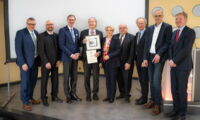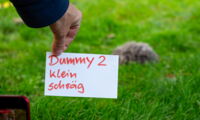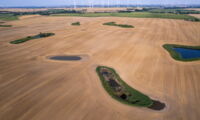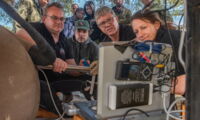The Leibniz-IZW is an internationally renowned German research institute. It is part of the Forschungsverbund Berlin e.V. and a member of the Leibniz Association. Our goal is to understand the adaptability of wildlife in the context of global change and to contribute to the enhancement of the survival of viable wildlife populations. For this purpose, we investigate the diversity of life histories, the mechanisms of evolutionary adaptations and their limits, including diseases, as well as the interrelations of wildlife with their environment and people. We use expertise from biology and veterinary medicine in an interdisciplinary approach to conduct fundamental and applied research – from the molecular to the landscape level – in close dialogue with the public and stakeholders. Additionally, we are committed to unique and high-quality services for the scientific community.
+++ Current information on African swine fever: The Leibniz-IZW conducts research on the population dynamics, on models of disease outbreaks in wild boars and on the ecology and human-wildlife interaction in urban areas. African swine fever is a reportable disease in domestic swine and therefor is the purview of the respective federal state laboratories and the Friedrich-Loeffler-Institut (Federal Research Institute for Animal Health) FLI. +++
News
-g4wdshcpeav7nts.jpg)
Founding Director of the Leibniz Institute for Zoo and Wildlife Research, Prof Reinhold R Hofmann, has passed away
According to his family, the veterinarian scientist Prof Dr Reinhold R Hofmann passed away on 30 March 2025 at the age of 92. Hofmann worked at Justus Liebig University Giessen (JLU), in Kenya, the USA and finally back at JLU. In 1992, Hofmann was appointed as founding director of the Leibniz Institute for Zoo and Wildlife Research (Leibniz-IZW) in Berlin and the first professor for Interdisciplinary Zoo and Wildlife Science in Germany at the Freie Universität Berlin. He headed the Leibniz-IZW until his retirement at the end of 1999.
_web-2rk2dg48pp2tqd6.jpg)
Reduced movement of starlings with parasite infections has a negative impact on their offspring
Infections with parasites often entail no recognisable signs in many wildlife species, but can have still negative effects across generations. Infected animals often have a slightly reduced body size and their offspring have a harder start in life. A team of scientists from the Leibniz Institute for Zoo and Wildlife Research (Leibniz-IZW), the Technische Universität Berlin and the University of Potsdam now have shown for the first time, that the impaired reproductive success is connected to altered movement behaviour: Infected starlings have a smaller action radius, which limits their access to high-quality foraging habitats. The paper is published in the scientific journal “Proceedings of the Royal Society B: Biological Sciences”.

Goodbye after 25 years: Leibniz-IZW bids farewell to long-time director Prof Heribert Hofer
On 28 March 2025, the Leibniz Institute for Zoo and Wildlife Research (Leibniz-IZW) bid farewell to its director Prof Heribert Hofer after more than 25 years in office. His temporary successor, Prof Jörns Fickel, head of the Department of Evolutionary Genetics, will take over on 1st April 2025. A joint appointment for the directorate of the Leibniz-IZW and the professorship for Interdisciplinary Zoo and Wildlife Research at the Freie Universität Berlin is underway.
_web-w7tgbq5c1gpv289.jpg)
Bats play a key role in combating rice pests in Southeast Asia
Scientists from the Leibniz Institute for Zoo and Wildlife Research (Leibniz-IZW) and the Prince of Songkla University in Thailand have demonstrated that Wrinkle-lipped free-tailed bats not only travels great distances, but also hunt at impressive altitudes of up to 1,600 metres above ground – the altitude at which many planthoppers fly, which are dreaded insect pests of rice plants. Conventional methods of pest control such as insecticides do not work at these altitudes. By restricting the spread of high-flying planthoppers, Wrinkle-lipped free-tailed bats make an important contribution to pest control and thus also to food security in South and East Asia. The article published in the scientific journal "Oecologia" therefore emphasises how important and valuable it is to protect this bat species.
Read more … Bats play a key role in combating rice pests in Southeast Asia
_photos%20by%20leibniz-izw_web-rpw5cf535zsh0ms.jpg)
Wildlife camera surveys in Viet Nam reveal the conservation importance of habitat transition zones
Globally, tropical rain forests are among the most species-rich habitats and are therefore often prioritised in conservation efforts. A team of scientists from Viet Nam and Germany now show that the diversity of ground-dwelling mammals and birds in Nui Chua National Park (Viet Nam) is highest in semi-dry forest, the transitional habitat where dry and wet evergreen broadleaf forest habitats meet. These results highlight the conservation importance of habitat transition zones, the scientists write in a paper published in the journal “Biotropica”.

Crash tests, emergency brake assistants and night bans: How automated lawnmowing is becoming hedgehog-proof
Night-time collisions with robotic lawnmowers are a significant animal welfare and conservation problem for hedgehogs as these often suffer serious or even fatal injuries. In order to make the operation of robotic lawnmowers hedgehog-safe, the Leibniz Institute for Zoo and Wildlife Research (Leibniz-IZW), the specialist crash test company CTS and the computer magazine c't are developing special hedgehog dummies and standardised tests to prevent fatal collisions. National and international experts will be discussing the latest developments in this project and many other topics related to hedgehog research, animal welfare and conservation at two conferences organised by the Leibniz-IZW in Berlin from January 16 to 19, 2025.

Wind turbines impair the access of bats to water bodies in agricultural landscapes
Bats depend on open bodies of water such as small ponds and lakes for foraging and drinking. Access to water is particularly important for survival in the increasingly hot and dry summers caused by climate change, the time when female bats are pregnant and rear their young. A scientific team from the Leibniz Institute for Zoo and Wildlife Research (Leibniz-IZW) has now shown that access to drinking sites is hampered by wind turbines in agricultural landscapes: Many bat species avoid the turbines and water bodies located close to the turbines for several kilometres. These results have been published in the scientific journal “Biological Conservation”.
Read more … Wind turbines impair the access of bats to water bodies in agricultural landscapes

BioRescue scientists receive prestigious prize and announce five new northern white rhino embryos produced in the second half of 2024
The BioRescue project develops and pioneers advanced assisted reproduction technologies (aART) for biodiversity conservation, especially for rhinos. In a paper published in the journal “Reproduction” in October 2023, the team evaluated ovum pick-up (OPU) and in-vitro fertilisation (IVF) procedures and showed that aART in white rhinos is safe for the donor females and can reliably yield viable embryos. This scientific paper now received the prize for best research published in the journal in 2023, awarded by the Society for Reproduction and Fertility. BioRescue furthermore announces the production of five additional embryos from northern white rhino Fatu in the second half of 2024, adding to the outcome of five years of work since the first OPU in 2019.




